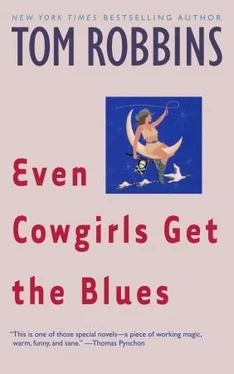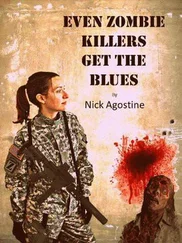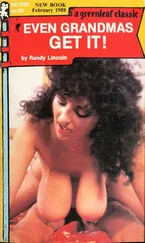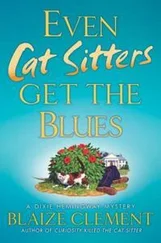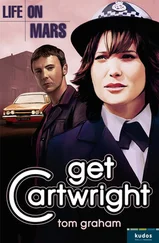“How has it worked out?” asked Julian.
“In all truthfulness, I don't know. Communications from the ranch have been few and far between. I've called Miss Adrian several times, but the phone's out of order more often than not — it's a rather remote region — and when I've reached her she's been evasive. I think the cowgirls have her intimidated. On top of that, there's that crazed hermit sitting up on his perch watching the place all the time. The old coot is probably working a Chinese hoodoo voodoo on the whole operation. Gives me the shivers. You can understand why I'm curious. And why I'd like Sissy to check out the scene. What do you say?”
Julian answered for them. “Let us have tonight to talk it over,” he said. “We'll let you know in the morning.”
The Countess wasn't used to being put off, but he agreed. With his monocle casting a harsh glint on the wallpaper, and his good-by mangled by the emery of animated teeth, he departed.
Discussion between the newlyweds erupted almost at once — and for a while it went smoothly enough. They were quick to agree that the offer had merit. They'd been breathing the same air for nine months, night and day, and a short vacation would refresh them both. Sissy's boredom with her new, inactive life was the principal source of their friction. A modeling assignment, especially one as interesting and lucrative as this one, could be a tonic for her. And while she was away, Julian could have some people over for poulet sauté aux herbes de Provence (his speciality), and perhaps join a group at Elaine's. By all means, a short separation could have salubrious effects.
It was when Sissy announced her intentions to hitchhike to Dakota that conversation took on a tin edge, and Julian foamed and wheezed. He couldn't understand it; he couldn't comprehend it; he couldn't fathom it; he couldn't (choose your synonym). It frightened him, saddened him, drove him to the Scotch bottle and even to the medicine cabinet to fondle his nail scissors theatrically (Having no facial hair, Indians seldom own razors). He unleashed barrage after barrage of his heaviest asthmatic artillery. But Sissy stood her ground, and next morning when the Countess phoned, Julian told him:
“She's delighted to be of service. She'll leave on Sunday. She's starting early because (sob) she insists on hitchhiking. God, just when I thought she was getting over it. Those thumbs of hers, those unfortunate redundancies; they are of no significance, yet how they complicate our lives.”
In the bedroom, sorting out her old jumpsuits, Sissy overheard the complaint. Slowly, she turned her hands in the mirror, like stems, like daggers, like bottles missing labels.
They seemed the best part of her body, her thumbs. The substantial, uncomplicated part. No orifices riddled them; no hair hung from them; they secreted nothing and harbored no senses to satisfy. They contained no slimy entrails; ganglia did not adorn them; they produced nothing that might be compared with earwax, tooth decay or toe jam. They were but the sweet, the unadulterated, the thick pulp of her own life, there in smooth volume and closed form, complete.
Trembling while she did so, and blushing afterward, she kissed them. She blessed her life.
These thumbs. They had created a reality for her when only somebody else's crippled notion of reality, some socially sanctioned parody of reality, was to be her lot. And now they were about to transport her to the Rubber Rose Ranch.
Out where tall birds waded in a lake named for her Siwash kin.
Out where Smokey the Bear lay down his shovel to romp with more playful beasts.
Out where starlight had no enemies and the badland wind no friends.
Out where the boogie stopped and the woogie began.
Though from time immemorial there were girls upon the ranches who could ride wild horses, they did it under protest and did not pride themselves upon it. Even today, in the great cattle countries of the south, no woman rides except upon a journey, and I do not think that even in the United States that many women take part in steer-roping or rounding up the stock.
— Sir Charles Walter Simpson
32.
THE BROWN PAPER BAG is the only thing civilized man has produced that does not seem out of place in nature.
Crumpled into a wad of wrinkles, like the fossilized brain of a dryad; looking weathered; seeming slow and rough enough to be a product of natural evolution; its brownness the low-key brown of potato skin and peanut shell — dirty but pure; its kinship to tree (to knot and nest) unobscured by the cruel crush of industry; absorbing the elements like any other organic entity; blending with rock and vegetation as if it were a burrowing owl's doormat or a jack rabbit's underwear, a No. 8 Kraft paper bag lay discarded in the hills of Dakota — and appeared to live where it lay.
Now empty and leathery-wrinkled, the bag had been twice full. Once, long ago, it had borne a package of buns and a jar of mustard to a kitchenette rendezvous with fried hamburger. More recently, the bag had held love letters.
As a hole in an oak hides a squirrel's family jewels, the bag had hidden love letters in the bottom of a bunkhouse trunk. Then, one day after work, the button-nosed little cowgirl to whom the letters were addressed gathered bag and contents under her arm, slipped out to the corral, past ranch hands pitching horseshoes and ranch hands flying Tibetan kites, saddled up and trotted into the hills. A mile or more from the bunkhouse, she dismounted and built a small fire. She fed the fire letters, one by one, the way her boy friend had once fed her french fries.
As words such as sweetheart and honey britches and forever and always burned away, the cowgirl squirted a few tears. Her eyes were so misty she forgot to burn the bag.
Back at the bunkhouse, in the twilight, her companions pretended they didn't know where she had gone or why. Big Red offered her a piece of homemade fudge and showed no surprise when she refused it. Kym, before retiring, smeared a fast kiss across her lips — very casual, as if she were brushing off a piece of lint. And Jelly, who'd been trying to plunk a carefree song on a hard-timed old Gibson, looked up at her and said, “You know, podner, you can tune a guitar but you can't tuna fish.”
She was one of them now. God but it's good to be a cowgirl!
33.
THE OUTHOUSE RADIO WAS PLAYING “The Starving Armenians Polka.” Rain, a sudden downpour, a regular Dakota summer cloudburst, had trapped Bonanza Jellybean and Delores del Ruby in the privy. First Delores and then Jelly finished her business and pantsed up, but still they sat there.
“Well, I'm not scared of a little rain,” announced Jelly.
“Me neither,” said Delores, who would never admit to being afraid of anything .
But neither made a move to leave. Instead, they stared out the door at the staircase of water that so resembled the one on which mermaids greet drowned sailors ("Would you like to come up to my room?” asks a mermaid, not much older than a cowgirl. “You bet, you bet,” glubs the excited sailor, silently thanking his hometown recruiting officer that he hadn't had the misfortune to die on dry land). The stairs of water hung there, in what used to be air, as if waiting for a midget submarine to slide down its banister.
“Might as well brave it,” said Jelly, moving to the door. She was the ranch boss and had to set an example.
“Right,” agreed Delores, the forewoman. “I don't know about you but I'm sure not sweet enough to melt.” She flicked her whip at a sweat bee that had also taken refuge in the privy. (Actually, she had been trying to wound not the bee but the photograph of Dale Evans upon which it had lit.)
Читать дальше
